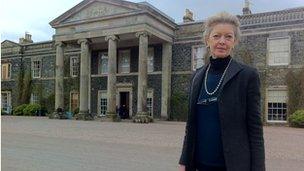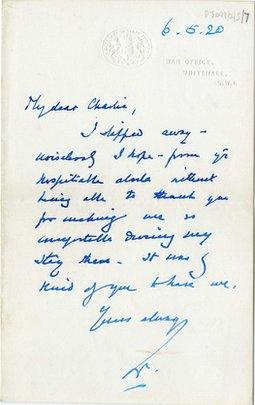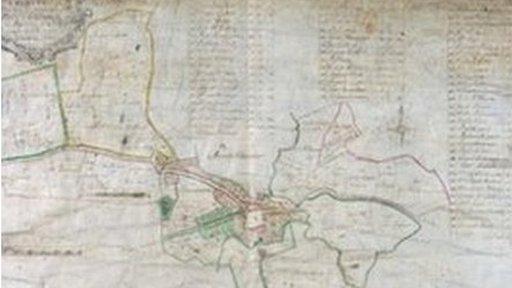Londonderry Papers archive bought by PRONI
- Published

Lady Rose wants people to see the full range of historical and political documents her ancestors passed down.
What links Winston Churchill, Edward Carson, Queen Victoria and W. B. Yeats?
The Stewart family.
From prime minister to poet, a wealth of people sent letters to the landowning Stewart family over the generations.
Now for the first time, those letters, along with all 30,000 documents in the influential family's collection, have been bought by PRONI (the Public Record Office of Northern Ireland) and can be viewed by anyone.
The oldest document in the archive dates back to 1612.

Churchill wrote to the Stewarts in 1920: "I slipped away - noiselessly I hope - from your hospitable abode without being able to thank you for making me so comfortable during my stay here."
The Londonderry Papers, as they are known, cost £665,000 to bring into public ownership.
Before now, some of the archive was on indefinite loan to PRONI but the family could prevent certain things from being published.
However following the death of Lady Mairi Bury in 2009, her daughter, Lady Rose Lauritzen, has sold the papers.
'Everyone's dead'
It was a difficult decision to make, Lady Rose told the BBC's Radio Ulster.
Speaking at Mount Stewart, the family home in County Down, she said the concept of "fair access" had guided her decision.
"There might be some things that I think - oh, whoops - but I think it's important that there's fair access," she said.
"Any political thing - I think that should be seen."
Worried about putting the family's personal letters on display, she asked her late cousin, the ninth Marquess of Londonderry, for advice.
"Don't worry, Rosie," he told her. "It doesn't matter - practically everyone's dead."
Appeasement
Lady Rose's grandfather, the seventh Marquess of Londonderry, believed in appeasement in the 1930s, to try and prevent the UK going to war with Hitler's Germany.
He visited senior Nazis in Germany and entertained the German foreign minister von Ribbentrop at home.
Historian Eamon Phoenix said: "He and his wife began sort of a private bid to cultivate Hitler and Ribbentrop during that period, and this was the most controversial period.
"We have letters from Hitler thanking Lady Londonderry for her lovely Irish roses."
Lady Rose said that her grandfather's belief in appeasement stemmed from his experience decades before, of seeing a good friend killed in the trenches of the First World War.
"What will slightly annoy me is if (researchers) all go straight to the German episode," she said. "For some reason today that's very fashionable. In school, children learn about Henry VIII and Hitler and nothing else to do with history."
As the archive covers nearly four centuries and takes up 172 metres on the shelves of PRONI, historians will have plenty to choose from.
There is just one set of personal letters that Lady Rose decided not to sell to PRONI.
The letters were between her grandmother and pilot of her father.
The pilot eloped with her aunt.
The couple never got parental blessing for their wedding, and they separated shortly afterwards.
Apart from those letters, Lady Rose is sticking to her cousin's advice.
"If people don't want letters seen they should have thrown them away," she said.
"I have thrown lots of letters away belonging to my mother, for instance, that wouldn't be of any historical interest.
"If they didn't want them seen, they should have burnt them, so if everyone sees them - too bad."

This map of Comber was drawn in 1722 and is part of the Londonderry Papers.